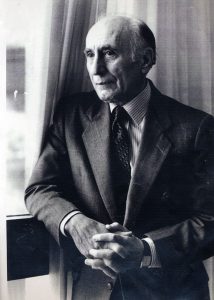About Ehsan Yarshater
 Ehsan Yarshater
Ehsan Yarshater
April 3, 1920 – September 2, 2018
Hagop Kevorkian Professor Emeritus of Iranian Studies, Columbia University

Ehsan Yarshater was born in Hamadan on April 3, 1920. Growing up mostly in Tehran, he finished his secondary education at the top of his class, with this success earning him a scholarship to study at the Faculty of Literature and the Teacher’s College of the University of Tehran. Upon graduation from the Teacher’s College in 1941, he joined the service of the Ministry of Education as a teacher at Elmieh High School in Tehran. By 1944, he was appointed Deputy Director of the Preparatory Educational College (Danesh-sara-ye Moqaddamati) in Tehran. While working in the field of education, he studied at the Faculty of Law and earned his B.A. In addition, he pursued the study of Persian literature at the University of Tehran, receiving a Doctorate in 1947. He then continued his studies in England after receiving a scholarship from the British Council. Under the tutelage of W.B. Henning, he studied Old and Middle Iranian Languages and received an M.A. in 1953. In 1960, he earned a second Ph.D. from the University of London by defending his dissertation, Southern Tati Dialects, during the meeting of the Congress of the Orientalists held in Moscow that year.
 While working towards his second Doctorate, he founded The [Royal] Institute for Translation and Publication (Bongah-e Tarjomeh va Nashr-e Ketab – BTNK). Since its foundation in 1953 until 1979, the institute published over 500 volumes, encompassing three series (a Persian text series, a series on Iranian Studies, and a series of classic works translated into Persian), and general knowledge books intended to enrich the lives of a wide audience. The BTNK has been lauded as the most important publisher to come into being in Iran.
While working towards his second Doctorate, he founded The [Royal] Institute for Translation and Publication (Bongah-e Tarjomeh va Nashr-e Ketab – BTNK). Since its foundation in 1953 until 1979, the institute published over 500 volumes, encompassing three series (a Persian text series, a series on Iranian Studies, and a series of classic works translated into Persian), and general knowledge books intended to enrich the lives of a wide audience. The BTNK has been lauded as the most important publisher to come into being in Iran.
In 1953, Ehsan Yarshater was appointed first as an Assistant Professor of Persian Literature and the following year of Old Persian in the Faculty of Letters at the University of Tehran. In 1958, he was invited by Columbia University to serve as Visiting Associate Professor of Indo-Iranian for two years. In 1960, he succeeded Professor Ebrahim Pourdavoud as Professor of Ancient Iranian Culture at the University of Tehran. In 1961, he was invited back by Columbia University to occupy the newly founded Chair of Iranian Studies, endowed by Hagop Kevorkian, a well-known Armenian art collector. There, he was tasked with developing the field of Iranian Studies at Columbia University, which resulted in the founding of the Center for Iranian Studies at Columbia University in 1968.
 Professor Yarshater authored several books and served as the Editor or General Editor of numerous scholarly works. His books include Persian Poetry in the Second Half of the 15th Century (in Persian, 1953), and Southern Tati Dialects (1970). He edited the third volume of Cambridge History of Iran, in two parts, covering the Seleucid, Parthian, and Sasanian periods (1983 and 1986), and Persian Literature (1988). He was the Founding General Editor of the Persian Text Series, the Persian Heritage Series, the Persian Studies Series, and the Modern Persian Literature Series. The annotated translation of Tabari’s History in 40 volumes was completed under his General Editorship. He was also the Founding Editor of the Encyclopaedia Iranica, widely regarded as the most comprehensive and accessible reference work on the Iranian civilization. He was also the Founding Editor of A History of Persian Literature, an authoritative survey designed to reflect the status and significance of Persian literature. It includes extensive, and carefully selected specimens of poetry and prose with translations and commentary by prominent scholars.
Professor Yarshater authored several books and served as the Editor or General Editor of numerous scholarly works. His books include Persian Poetry in the Second Half of the 15th Century (in Persian, 1953), and Southern Tati Dialects (1970). He edited the third volume of Cambridge History of Iran, in two parts, covering the Seleucid, Parthian, and Sasanian periods (1983 and 1986), and Persian Literature (1988). He was the Founding General Editor of the Persian Text Series, the Persian Heritage Series, the Persian Studies Series, and the Modern Persian Literature Series. The annotated translation of Tabari’s History in 40 volumes was completed under his General Editorship. He was also the Founding Editor of the Encyclopaedia Iranica, widely regarded as the most comprehensive and accessible reference work on the Iranian civilization. He was also the Founding Editor of A History of Persian Literature, an authoritative survey designed to reflect the status and significance of Persian literature. It includes extensive, and carefully selected specimens of poetry and prose with translations and commentary by prominent scholars.
Professor Yarshater was an honorary member of the Societas Iranologica Europaea and the Association for Iranian Studies, for which he served as President. He was also a life member of the American Institute of Iranian Studies. A number of lecture series in his name have been instituted at the University of California, Los Angeles (UCLA), the universities of London and Paris, and Yale University.
Professor Ehsan Yarshater transformed Iranian studies, creating a legacy worldwide that will continue to advance the scholarship and understanding of the histories, cultures, and accomplishments of Iranian peoples. He was truly endowed with a bold and broad academic vision, immense erudition, and unfailing determination.

